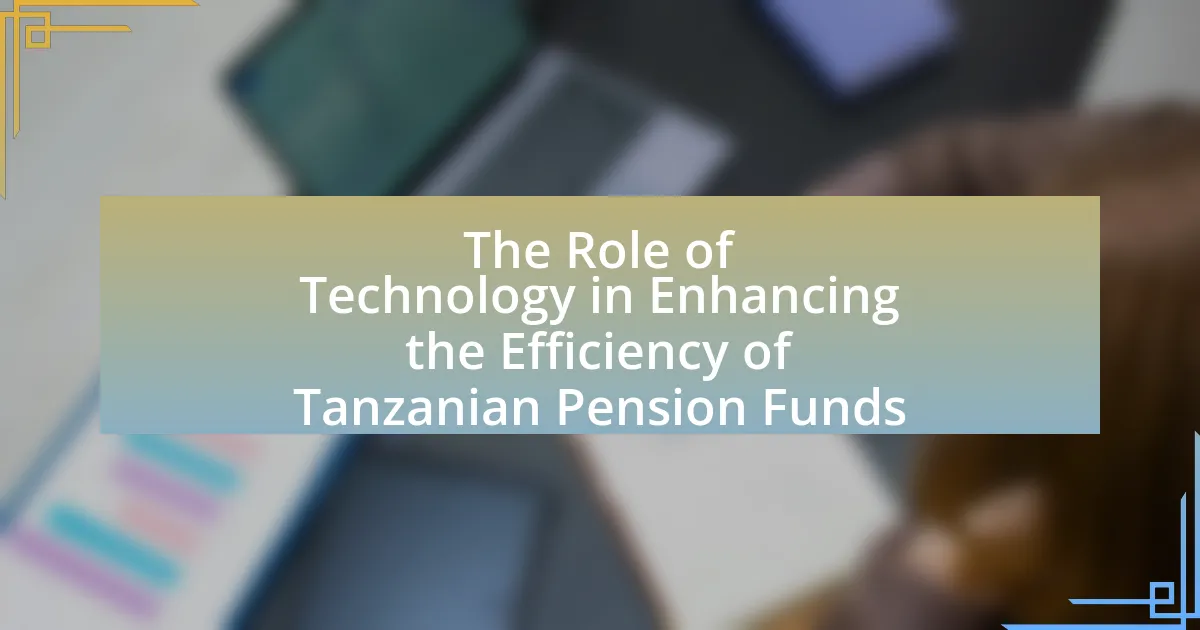Pension funds in Tanzania are financial institutions that manage savings from individuals and employers to provide retirement benefits, playing a crucial role in alleviating poverty among the elderly population. The article explores the operation of these funds, their key components, and their significance in ensuring financial security for retirees while contributing to economic stability through investments in various sectors. It also addresses the challenges faced by pension funds, including regulatory issues, low coverage rates, and social factors, and discusses potential improvements and best practices from successful pension systems in other countries. Additionally, the article highlights the importance of technology and community engagement in enhancing the effectiveness of pension funds in Tanzania.

What are Pension Funds and Their Importance in Tanzania?
Pension funds in Tanzania are financial institutions that collect and manage savings from individuals and employers to provide retirement benefits. These funds are crucial for ensuring financial security for retirees, as they help mitigate poverty by providing a steady income after individuals cease working. In Tanzania, pension funds also contribute to economic stability by investing in various sectors, which can lead to job creation and infrastructure development. According to the National Social Security Fund (NSSF), pension funds in Tanzania have grown significantly, with assets reaching over 5 trillion Tanzanian Shillings, highlighting their importance in both individual financial planning and national economic growth.
How do Pension Funds operate in Tanzania?
Pension funds in Tanzania operate as collective investment schemes that manage contributions from employees and employers to provide retirement benefits. These funds are regulated by the National Social Security Fund (NSSF) and the Pension Funds Act, which ensure that they adhere to specific guidelines for investment and management.
The primary function of these pension funds is to accumulate savings over the working life of individuals, which are then disbursed as pensions upon retirement. As of 2021, Tanzania had several pension schemes, including the Public Service Pension Fund (PSPF) and the National Social Security Fund (NSSF), which collectively manage billions of Tanzanian shillings in assets.
These funds invest in various sectors, including real estate, government securities, and equities, aiming to generate returns that can sustain pension payouts. The effectiveness of pension funds in mitigating poverty is evident as they provide a safety net for retirees, reducing reliance on family support and enhancing financial security in old age.
What are the key components of Pension Funds in Tanzania?
The key components of pension funds in Tanzania include contributions, investment strategies, benefits, and regulatory frameworks. Contributions are made by both employers and employees, forming the financial backbone of the pension system. Investment strategies involve the allocation of these contributions into various assets to generate returns, which are crucial for fund sustainability. Benefits are the payouts received by retirees, which are determined by the fund’s rules and the amount contributed over time. Regulatory frameworks, established by the National Social Security Fund and other governing bodies, ensure compliance and protect the interests of fund members. These components collectively contribute to the effectiveness of pension funds in providing financial security for retirees in Tanzania.
How do these components interact to support pensioners?
Pension funds, government policies, and financial literacy programs interact to support pensioners by providing financial security, ensuring access to benefits, and enhancing informed decision-making. Pension funds accumulate contributions from workers and employers, which are then disbursed as retirement benefits, directly addressing the income needs of pensioners. Government policies, such as social security frameworks, establish regulations that protect pensioners’ rights and ensure timely benefit payments. Additionally, financial literacy programs educate pensioners on managing their funds effectively, enabling them to make informed choices about their finances. Together, these components create a comprehensive support system that mitigates poverty among pensioners in Tanzania.
Why are Pension Funds critical for poverty alleviation in Tanzania?
Pension funds are critical for poverty alleviation in Tanzania because they provide a reliable source of income for retirees, reducing the financial vulnerability of the elderly population. In Tanzania, where a significant portion of the population lives below the poverty line, pension funds help ensure that retirees can maintain a basic standard of living, thereby decreasing the overall poverty rate. According to the National Bureau of Statistics, approximately 28% of Tanzanians aged 60 and above live in poverty, highlighting the need for financial security in old age. By offering regular payouts, pension funds contribute to economic stability and empower retirees to participate in local economies, which further supports poverty alleviation efforts.
What role do Pension Funds play in providing financial security?
Pension funds play a crucial role in providing financial security by ensuring a steady income for individuals during retirement. They accumulate contributions from employees and employers over time, which are then invested to generate returns. This investment strategy allows pension funds to grow, ultimately providing retirees with a reliable source of income that can help maintain their standard of living. In Tanzania, pension funds are particularly significant as they contribute to poverty alleviation by offering financial stability to retirees, thereby reducing the risk of poverty among the elderly population. According to the National Social Security Fund of Tanzania, pension benefits help improve the quality of life for retirees, demonstrating the essential role these funds play in enhancing financial security.
How do Pension Funds contribute to economic stability in the country?
Pension funds contribute to economic stability in the country by providing a reliable source of long-term capital for investments, which supports infrastructure development and job creation. These funds typically invest in various sectors, including real estate, stocks, and bonds, which stimulates economic growth. For instance, in Tanzania, pension funds have been instrumental in financing large-scale projects, such as roads and energy facilities, thereby enhancing productivity and economic resilience. Additionally, the consistent payouts to retirees from these funds help maintain consumer spending, further stabilizing the economy.

What challenges do Pension Funds face in Tanzania?
Pension funds in Tanzania face several significant challenges, including inadequate regulatory frameworks, low coverage rates, and investment limitations. The regulatory environment often lacks clarity and consistency, which hampers the effective management and growth of pension funds. Additionally, only about 10% of the workforce is covered by formal pension schemes, leaving a vast majority without retirement savings. Investment restrictions further limit the ability of pension funds to diversify their portfolios and achieve optimal returns, impacting their sustainability and ability to provide adequate benefits. These challenges hinder the potential of pension funds to effectively mitigate poverty among the aging population in Tanzania.
How do regulatory issues impact Pension Funds?
Regulatory issues significantly impact pension funds by influencing their investment strategies, compliance costs, and overall financial stability. For instance, stringent regulations can limit the types of assets pension funds can invest in, potentially reducing their returns. In Tanzania, the Pension Act mandates specific investment guidelines, which can restrict pension funds from diversifying their portfolios effectively. Additionally, compliance with regulatory requirements often incurs high administrative costs, diverting resources away from benefits for pensioners. According to the World Bank, regulatory frameworks that are too rigid can hinder the growth of pension funds, ultimately affecting their ability to provide adequate retirement income and mitigate poverty among retirees.
What are the current regulations affecting Pension Funds in Tanzania?
The current regulations affecting pension funds in Tanzania are primarily governed by the Pension Act of 2012 and its subsequent amendments. These regulations establish the framework for the operation, management, and supervision of pension funds, ensuring they are financially sound and capable of meeting their obligations to members. The Act mandates the registration of pension funds with the Social Security Regulatory Authority (SSRA), which oversees compliance with investment guidelines, contribution rates, and benefit payments. Additionally, the regulations require pension funds to maintain a minimum funding level and to submit regular financial reports to the SSRA, thereby promoting transparency and accountability within the sector.
How do these regulations influence fund management and payouts?
Regulations significantly influence fund management and payouts by establishing guidelines that ensure transparency, accountability, and the protection of beneficiaries’ interests. For instance, regulations may require pension funds to maintain a certain level of liquidity, which affects how fund managers allocate assets and manage risks. Additionally, regulations often dictate the frequency and method of payouts to retirees, ensuring that funds are distributed fairly and sustainably. In Tanzania, adherence to the National Pension Act mandates that pension funds must provide a minimum return on investments, which directly impacts the financial health of the fund and the amount available for payouts to beneficiaries. This regulatory framework is crucial for maintaining trust in the pension system and ensuring that it effectively mitigates poverty among retirees.
What are the social challenges affecting Pension Funds?
Social challenges affecting pension funds include demographic shifts, economic inequality, and inadequate financial literacy among the population. Demographic shifts, such as an aging population, increase the dependency ratio, placing financial strain on pension systems. Economic inequality leads to disparities in contributions and benefits, making it difficult for pension funds to provide adequate support to all members. Additionally, inadequate financial literacy prevents individuals from understanding the importance of saving for retirement, resulting in lower participation rates in pension schemes. These factors collectively undermine the sustainability and effectiveness of pension funds in mitigating poverty in Tanzania.
How does public perception influence the effectiveness of Pension Funds?
Public perception significantly influences the effectiveness of pension funds by shaping trust and participation levels among contributors. When the public views pension funds positively, individuals are more likely to contribute, ensuring a larger pool of resources for future payouts. For instance, a survey conducted by the National Bureau of Statistics in Tanzania indicated that 70% of respondents who trust pension funds are more likely to enroll, directly impacting the funds’ financial stability and ability to mitigate poverty. Conversely, negative perceptions, often fueled by past mismanagement or lack of transparency, can lead to decreased participation, undermining the funds’ capacity to provide adequate support to retirees and vulnerable populations.
What demographic factors impact the sustainability of Pension Funds?
Demographic factors that impact the sustainability of pension funds include aging populations, birth rates, and migration patterns. An aging population increases the ratio of retirees to active workers, leading to higher payouts and potential funding shortfalls. For instance, in Tanzania, the proportion of the population aged 65 and older is projected to rise significantly, which can strain pension systems. Additionally, lower birth rates result in fewer contributors to pension funds, exacerbating financial pressures. Migration patterns, such as urbanization, can also affect the number of contributors and beneficiaries, influencing the overall sustainability of pension funds. These demographic trends highlight the need for adaptive strategies to ensure the long-term viability of pension systems.

How can Pension Funds be improved to better mitigate poverty in Tanzania?
Pension funds in Tanzania can be improved to better mitigate poverty by enhancing accessibility, increasing contribution rates, and diversifying investment strategies. Enhancing accessibility involves simplifying enrollment processes and expanding outreach to informal sector workers, who represent a significant portion of the workforce but often lack pension coverage. Increasing contribution rates can be achieved by incentivizing higher savings through tax benefits or matching contributions, which would bolster the fund’s capacity to provide adequate retirement benefits. Diversifying investment strategies to include more sustainable and growth-oriented assets can yield higher returns, thereby increasing the funds available for disbursement to retirees. According to the World Bank, only 10% of Tanzania’s labor force is covered by formal pension schemes, highlighting the urgent need for reforms to include more workers and improve financial security in retirement.
What best practices can be adopted from other countries?
Best practices that can be adopted from other countries include implementing mandatory pension contributions, enhancing financial literacy programs, and diversifying investment strategies. Countries like Sweden and Australia have successfully established mandatory pension systems that require both employers and employees to contribute, leading to higher retirement savings rates. Additionally, financial literacy initiatives in countries such as Singapore have improved individuals’ understanding of retirement planning, resulting in better financial decisions. Furthermore, diversifying investment strategies, as seen in Canada’s pension funds, can optimize returns and reduce risks, ultimately providing more sustainable income for retirees. These practices demonstrate effective approaches to strengthening pension systems and alleviating poverty among the elderly in Tanzania.
How have successful pension systems in other nations addressed similar challenges?
Successful pension systems in other nations have addressed similar challenges by implementing multi-pillar frameworks that combine public, private, and voluntary components to ensure sustainability and coverage. For instance, countries like Sweden and the Netherlands have established robust mandatory pension schemes that are complemented by private savings options, which enhance financial security for retirees. In Sweden, the income pension system is based on a pay-as-you-go model, while also allowing individuals to invest in premium pension funds, resulting in a diversified income source for retirees. The Netherlands employs a similar approach, with mandatory occupational pensions that cover a significant portion of the workforce, leading to high replacement rates for retirees. These systems have been effective in reducing poverty among the elderly, as evidenced by the low poverty rates among retirees in these countries, which are significantly lower than the OECD average.
What lessons can Tanzania learn from these systems?
Tanzania can learn the importance of establishing robust pension systems that provide financial security for the elderly, thereby reducing poverty levels. Countries with effective pension systems, such as Sweden and the Netherlands, demonstrate that comprehensive coverage and adequate benefits can significantly enhance the quality of life for retirees. For instance, Sweden’s pension system combines a public pension with mandatory occupational pensions, resulting in a lower poverty rate among the elderly, which was reported at 5% in 2020. By adopting similar strategies, Tanzania could improve its pension framework, ensuring that all citizens have access to sustainable income in their retirement years, ultimately contributing to poverty alleviation.
What innovative solutions can enhance the effectiveness of Pension Funds?
Innovative solutions that can enhance the effectiveness of pension funds include the integration of technology for better data management and investment strategies. Utilizing advanced analytics and artificial intelligence can improve decision-making processes, allowing pension funds to optimize asset allocation and risk management. For instance, a study by the World Bank indicates that technology-driven investment strategies can lead to a 20% increase in returns over traditional methods. Additionally, implementing mobile platforms for contributions and withdrawals can increase accessibility for members, particularly in regions like Tanzania, where financial inclusion is crucial for poverty alleviation. This approach not only streamlines operations but also encourages higher participation rates among the workforce.
How can technology improve access to Pension Funds for the underserved populations?
Technology can improve access to pension funds for underserved populations by enabling digital platforms that facilitate easier enrollment, contributions, and withdrawals. For instance, mobile banking applications allow individuals in remote areas to manage their pension accounts without needing to visit physical bank branches, which may be inaccessible. According to the World Bank, mobile money services have increased financial inclusion in Tanzania, with over 60% of adults using mobile money accounts, thereby enhancing their ability to save for retirement. Additionally, blockchain technology can provide secure and transparent transactions, ensuring that funds are managed efficiently and reducing the risk of fraud, which is crucial for building trust among underserved communities.
What role can community engagement play in strengthening Pension Funds?
Community engagement plays a crucial role in strengthening pension funds by fostering trust and participation among stakeholders. Engaged communities are more likely to contribute to pension schemes, ensuring a stable funding base. For instance, in Tanzania, initiatives that involve local populations in decision-making processes have led to increased awareness and participation in pension programs, resulting in higher enrollment rates. Research indicates that community-driven approaches can enhance the sustainability of pension funds by aligning them with the specific needs and preferences of the community, thereby improving financial literacy and encouraging long-term investment in retirement savings.
What practical steps can individuals take to maximize their benefits from Pension Funds?
Individuals can maximize their benefits from pension funds by actively participating in their pension plans, regularly contributing to their accounts, and understanding the investment options available. Active participation ensures that individuals are engaged with their retirement savings, while consistent contributions increase the overall fund value over time, leveraging the power of compound interest. Understanding investment options allows individuals to choose strategies that align with their risk tolerance and retirement goals, potentially leading to higher returns. For instance, according to the National Bureau of Statistics in Tanzania, individuals who regularly contribute to pension funds can expect to accumulate significantly more savings by retirement age compared to those who do not.





